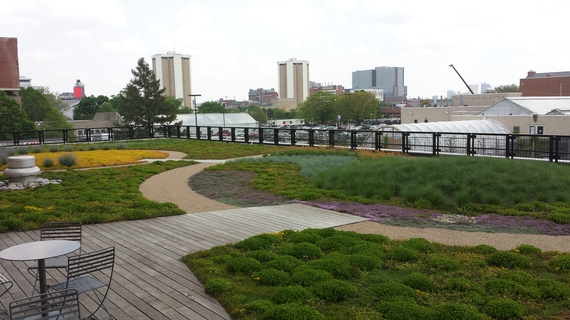Growing up, I watched George Will, the Pulitzer Prize-winning conservative pundit, almost every Sunday morning on "This Week: With George Stephanopolous" as he discussed the major sociopolitical issues of the day. I have always respected him: he is never afraid to criticize either political party (despite his conservatism) and is invariably well-spoken. However, his recent op-ed "Sustainability Gone Made on College Campuses" illustrates a complete misunderstanding of the word "sustainability," equating the term to "religious fundamentalism" that preaches "apocalyptic rhetoric." Mr. Will describes the practice of sustainability as undemonstrable and without social or scientific backing. Not only is his interpretation of the word incorrect, but he also misconstrues the entire culture behind sustainability.
In its simplest form, sustainability means greater efficiency and cutting waste to preserve both the natural environment and money. This is not a leftist agenda, but an alignment with both conservative and liberal values: by being more efficient, we conserve resources, save money, live within our means and innovate.
Dr. Yiying Wu of Ohio State is a testament to this. He and his students created a solar battery, a major step towards widespread renewable energy which is predicted to reduce the costs of solar energy by 25 percent. This is by no means the "marginalization of academia" that Mr. Will claims as a symptom of the movement, but rather a sustainable endeavor that holds both commercial and academic merit.
At Ohio State, I sit on the President and Provost's Council on Sustainability. In this role I have seen a few of the numbers concerning our campus' numerous sustainable investments. There are visible projects at Ohio State, such as the Howlett Hall Green Roof (Pictured Above). The roof provides annual energy savings of $10,347, the diversion of 191,196 gallons of stormwater and numerous educational benefits, not to mention the aesthetic appeal the green roof provides to the building. There are also more technical projects such as the control systems upgrade in the Agricultural Engineering Building, which after a one-time investment of $168,000 saves $50,200 in energy operations annually. Mr. Will's opinion that sustainability has only assumed and nebulous benefits is poorly researched; sustainability is becoming a common theme on campuses nationwide because there is money to be saved and made through it.
These are tangible benefits for the university, but more importantly for the environment. Green roofs reduce runoff, the primary contributor to algal blooms that needs to be accounted for, especially in places along the Great Lakes. This statement is not apocalyptic or fanatical -- just ask the residents of Toledo, Ohio. A widespread algal bloom in the area prevented 500,000 people from being able to drink tap water, even though the city had already spent $3 million the prior summer to prevent toxic algae. This problem could have been addressed in advance by reducing the amount of runoff from both farms and cities through more sustainable irrigation techniques or more green roofs. Improving sustainability is a measure that all cities and universities can take to reduce immediate and long-term environmental damage.
Much of Mr. Will's op-ed is a misrepresentation of sustainability culture, but there is one thing he got right: We are always looking for "converts" to see the benefits of sustainability. No, the movement is not comparable to "fundamentalism" as he describes, but many people no longer need the media or figures like him to guide them to falsehoods. They can see climate change, overfishing, algal blooms, environmental tragedies in the world today hurting them and want to do something. Republican or Democrat -‒ the environment does not discriminate.
So, when George Will cannot drink water due to an algal bloom, then he can try to convince the public that "every position whose title contains the word 'sustainability,'" including mine, is not necessary. Until that point, continue to sit in your ivory tower Mr. Will, while sustainable conservatives and liberals alike attempt to fix some of the major problems affecting people today.
